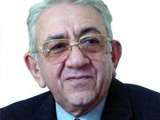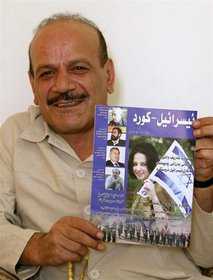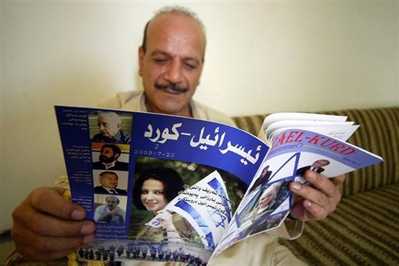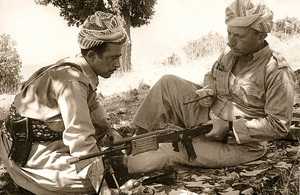Poor Richard’s Report
Over 300,001 readers
My Mission: God has uniquely designed me to seek, write, and speak the truth as I see it. Preservation of one’s wealth while providing needful income is my primary goal in these unsettled times. I have given the ability to evaluate study, and interpret world and national events and their influence on future of the financial markets. This gift allows me to meet the needs of individual and institution clients. I evaluate situations first on a fundamental basis then try to confirm on a technical basis. In the past it has been fairly successful.
Contact John Mauldin
Print Version
Volume 5 – Special Edition
August 20, 2009
Iraq Endgame
By George Friedman
As many of have heard, I had the pleasure of partaking in a weekend of fishing and intellectual jousting with some of today’s most brilliant minds. We spoke of war, politics, and of course, the economy. Their interconnection seems somehow much clearer sitting on a Maine lake fishing for bass. This week I offer you an article that’s key to understanding the U.S. role in Iraq. Futurologist and fellow aspiring fisherman George Friedman at STRATFOR lays out piece by piece U.S. options in the region. If your interests have anything to do with global energy markets — and whose don’t? — it’s enormously important that you grasp the relationships between various sectors in and around Iraq, and the possibilities moving forward.
Staying aware of geopolitical imperatives around the globe is crucial to any comprehensive investment portfolio. I encourage you to check out STRATFOR’s Web site for whatever informs your investment area. Plus, my readers get a special membership rate.
John Mauldin, Editor
Outside the Box
Iraq Endgame
August 18, 2009
By George Friedman
Related Special Topic Pages
Iraq, Turkey and the Kurdish Position
Iraq, Iran and the Shia
Turkey’s Re-Emergence
U.S. Military Involvement in Iraq
Iraq’s Oil
Though the Iraq war is certainly not over, it has reached a crossroads. During the course of the war, about 40 countries sent troops to fight in what was called “Multi-National Force-Iraq.” As of this summer, only one foreign country’s fighting forces remain in Iraq — those of the United States. A name change in January 2010 will reflect the new reality, when the term “Multi-National Force-Iraq” will be changed to “United States Forces-Iraq.” If there is an endgame in Iraq, we are now in it.
The plan that U.S. President Barack Obama inherited from former President George W. Bush called for coalition forces to help create a viable Iraqi national military and security force that would maintain the Baghdad government’s authority and Iraq’s territorial cohesion and integrity. In the meantime, the major factions in Iraq would devise a regime in which all factions would participate and be satisfied that their factional interests were protected. While this was going on, the United States would systematically reduce its presence in Iraq until around the summer of 2010, when the last U.S. forces would leave.
Two provisos qualified this plan. The first was that the plan depended on the reality on the ground for its timeline. The second was the possibility that some residual force would remain in Iraq to guarantee the agreements made between factions, until they matured and solidified into a self-sustaining regime. Aside from minor tinkering with the timeline, the Obama administration — guided by Defense Secretary Robert Gates, whom Bush appointed and Obama retained — has followed the Bush plan faithfully.
The moment of truth for the U.S. plan is now approaching. The United States still has substantial forces in Iraq. There is a coalition government in Baghdad dominated by Shia (a reasonable situation, since the Shia comprise the largest segment of the population of Iraq). Iraqi security forces are far from world-class, and will continue to struggle in asserting themselves in Iraq. As we move into the endgame, internal and external forces are re-examining power-sharing deals, with some trying to disrupt the entire process.
There are two foci for this disruption. The first concerns the Arab-Kurdish struggle over Kirkuk. The second concerns threats to Iran’s national security.
The Kurdish Question
Fighting continues in the Kirkuk region, where the Arabs and Kurds have a major issue to battle over: oil. The Kirkuk region is one of two major oil-producing regions in Iraq (the other is in the Shiite-dominated south). Whoever controls Kirkuk is in a position to extract a substantial amount of wealth from the surrounding region’s oil development. There are historical ethnic issues in play here, but the real issue is money. Iraqi central government laws on energy development remain unclear, precisely because there is no practical agreement on the degree to which the central government will control — and benefit — from oil development as opposed to the Kurdish Regional Government. Both Kurdish and Arab factions thus continue to jockey for control of the key city of Kirkuk.
Arab, particularly Sunni Arab, retention of control over Kirkuk opens the door for an expansion of Sunni Arab power into Iraqi Kurdistan. By contrast, Kurdish control of Kirkuk shuts down the Sunni threat to Iraqi Kurdish autonomy and cuts Sunni access to oil revenues from any route other than the Shiite-controlled central government. If the Sunnis get shut out of Kirkuk, they are on the road to marginalization by their bitter enemies — the Kurds and the Shia. Thus, from the Sunni point of view, the battle for Kirkuk is the battle for the Sunni place at the Iraqi table.
Turkey further complicates the situation in Iraq. Currently embedded in constitutional and political thinking in Iraq is the idea that the Kurds would not be independent, but could enjoy a high degree of autonomy. Couple autonomy with the financial benefits of heavy oil development and the Kurdish autonomous region of Iraq becomes a powerful entity. Add to that the peshmerga, the Kurdish independent military forces that have had U.S. patronage since the 1990s, and an autonomous Kurdistan becomes a substantial regional force. And this is not something Turkey wants to see.
The broader Kurdish region is divided among four countries, Turkey, Iraq, Iran and Syria. The Kurds have a substantial presence in southeastern Turkey, where Ankara is engaged in a low-intensity war with the Kurdistan Workers’ Party (PKK), members of which have taken refuge in northern Iraq. Turkey’s current government has adopted a much more nuanced approach in dealing with the Kurdish question. This has involved coupling the traditional military threats with guarantees of political and economic security to the Iraqi Kurds as long as the Iraqi Kurdish leadership abides by Turkish demands not to press the Kirkuk issue.
Still, whatever the constitutional and political arrangements between Iraqi Kurds and Iraq’s central government, or between Iraqi Kurds and the Turkish government, the Iraqi Kurds have a nationalist imperative. The Turkish expectation is that over the long haul, a wealthy and powerful Iraqi Kurdish autonomous region could slip out of Baghdad’s control and become a center of Kurdish nationalism. Put another way, no matter what the Iraqi Kurds say now about cooperating with Turkey regarding the PKK, over the long run, they still have an interest in underwriting a broader Kurdish nationalism that will strike directly at Turkish national interests.
The degree to which Sunni activity in northern Iraq is coordinated with Turkish intelligence is unknown to us. The Sunnis are quite capable of waging this battle on their own. But the Turks are not disinterested bystanders, and already support local Turkmen in the Kirkuk region to counter the Iraqi Kurds. The Turks want to see Kurdish economic power and military power limited, and as such they are inherently in favor of the Shiite-dominated Baghdad government. The stronger Baghdad is, the weaker the Kurds will be.
Baghdad understands something critical: While the Kurds may be a significant fighting force in Iraq, they can’t possibly stand up to the Turkish army. More broadly, Iraq as a whole can’t stand up to the Turkish army. We are entering a period in which a significant strategic threat to Turkey from Iraq could potentially mean Turkish countermeasures. Iraqi memories of Turkish domination during the Ottoman Empire are not pleasant. Therefore, Iraq will be very careful not to cross any redline with the Turks.
This places the United States in a difficult position. Washington has supported the Kurds in Iraq ever since Operation Desert Storm. Through the last decade of the Saddam regime, U.S. special operations forces helped create a de facto autonomous region in Kurdistan. Washington and the Kurds have a long and bumpy history, now complicated by substantial private U.S. investment in Iraqi Kurdistan for the development of oil resources. Iraqi Kurdish and U.S. interests are strongly intertwined, and Washington would rather not see Iraqi Kurdistan swallowed up by arrangements in Baghdad that undermine current U.S. interests and past U.S. promises.
On the other hand, the U.S. relationship with Turkey is one of Washington’s most important. Whether the question at hand is Iran, the Caucasus, the Balkans, Central Asia, the Arab-Israeli conflict, Afghanistan, Russia or Iraq, the Turks have a role. Given the status of U.S. power in the region, alienating Turkey is not an option. And the United States must remember that for Turkey, Kurdish power in Iraq and Turkey’s desired role in developing Iraqi oil are issues of fundamental national importance.
Now left alone to play out this endgame, the United States must figure out a way to finesse the Kurdish issue. In one sense, it doesn’t matter. Turkey has the power ultimately to redefine whatever institutional relationships the United States leaves behind in Iraq. But for Turkey, the sooner Washington hands over this responsibility, the better. The longer the Turks wait, the stronger the Kurds might become and the more destabilizing their actions could be to Turkey. Best of all, if Turkey can assert its influence now, which it has already begun to do, it doesn’t have to be branded as the villain.
All Turkey needs to do is make sure that the United States doesn’t intervene decisively against the Iraqi Sunnis in the battle over Kirkuk in honor of Washington’s commitment to the Kurds.
In any case, the United States doesn’t want to intervene against Iraq’s Sunnis again. In protecting Sunni Arab interests, the Americans have already been sidestepping any measures to organize a census and follow through with a constitutional mandate to hold a referendum in Kirkuk. For the United States, a strong Sunni community is the necessary counterweight to the Iraqi Shia since, over the long haul, it is not clear how a Shiite-dominated government will relate to Iran.
The Shiite Question
The Shiite-dominated government led by Iraqi Prime Minister Nouri al-Maliki is no puppet of Iran, but at the same time, it is not Iran’s enemy. As matters develop in Iraq, Iran remains the ultimate guarantor of Shiite interests. And Iranian support might not flow directly to the current Iraqi government, but to al-Maliki’s opponents within the Shiite community who have closer ties to Tehran. It is not clear whether Iranian militant networks in Iraq have been broken, or are simply lying low. But it is clear that Iran still has levers in place with which it could destabilize the Shiite community or rivals of the Iraqi Shia if it so desired.
Therefore, the United States has a vested interest in building up the Iraqi Sunni community before it leaves. And from an economic point of view, that means giving the Sunnis access to oil revenue as well as a guarantee of control over that revenue after the United States leaves.
With the tempo of attacks picking up as U.S. forces draw down, Iraq’s Sunni community is evidently not satisfied with the current security and political arrangements in Iraq. Attacks are on the upswing in the northern areas — where remnants of al Qaeda in Iraq continue to operate in Mosul — as well as in central Iraq in and around Baghdad. The foreign jihadists in Iraq hope such attacks will trigger a massive response from the Shiite community, thus plunging Iraq back into civil war. But the foreign jihadists would not be able to operate without some level of support from the local Sunni community. This broader community wants to make sure that the Shia and Americans don’t forget what the Sunnis are capable of should their political, economic and security interests fall by the wayside as the Americans withdraw.
Neither the Iraqi Sunnis nor the Kurds really want the Americans to leave. Neither trust that the intentions or guarantees of the Shiite-dominated government. Iraq lacks a tradition of respect for government institutions and agreements; a piece of paper is just that. Instead, the Sunnis and Kurds see the United States as the only force that can guarantee their interests. Ironically, the United States is now seen as the only real honest broker in Iraq.
But the United States is an honest broker with severe conflicts of interest. Satisfying both Sunni and Kurdish interests is possible only under three conditions. The first is that Washington exercise a substantial degree of control over the Shiite administration of the country — and particularly over energy laws — for a long period of time. The second is that the United States give significant guarantees to Turkey that the Kurds will not extend their nationalist campaign to Turkey, even if they are permitted to extend it to Iran in a bid to destabilize the Iranian regime. The third is that success in the first two conditions not force Iran into a position where it sees its own national security at risk, and so responds by destabilizing Baghdad — and with it, the entire foundation of the national settlement in Iraq negotiated by the United States.
The American strategy in this matter has been primarily tactical. Wanting to leave, it has promised everyone everything. That is not a bad strategy in the short run, but at a certain point, everyone adds up the promises and realizes that they can’t all be kept, either because they are contradictory or because there is no force to guarantee them. Boiled down, this leaves the United States with two strategic options.
First, the United States can leave a residual force of about 20,000 troops in Iraq to guarantee Sunni and Kurdish interests, to protect Turkish interests, etc. The price of pursuing this option is that it leaves Iran facing a nightmare scenario: e.g., the potential re-emergence of a powerful Iraq and the recurrence down the road of the age-old conflict between Persia and Mesopotamia — with the added possibility of a division of American troops supporting their foes. This would pose an existential threat to Iran, forcing Tehran to use covert means to destabilize Iraq that would take advantage of a minimal, widely dispersed U.S. force vulnerable to local violence.
Second, the United States could withdraw and allow Iraq to become a cockpit for competition among neighboring countries: Turkey, Iran, Saudi Arabia, Syria — and ultimately major regional powers like Russia. While chaos in Iraq is not inherently inconsistent with U.S. interests, it is highly unpredictable, meaning the United States could be pulled back into Iraq at the least opportune time and place.
The first option is attractive, but its major weakness is the uncertainty created by Iran. With Iran in the picture, a residual force is as much a hostage as a guarantor of Sunni and Kurdish interests. With Iran out of the picture, the residual U.S. force could be smaller and would be more secure. Eliminate the Iran problem completely, and the picture for all players becomes safer and more secure. But eliminating Iran from the equation is not an option — Iran most assuredly gets a vote in this endgame.
John F. Mauldin
[email protected]
You are currently subscribed as [email protected].
To unsubscribe, go here.









